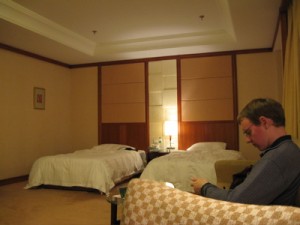If you missed it, be sure to check part one.
Working Ourselves Up
Once we were checked into our hotel, the urge to check out of our adventure loomed its head. The relief of solving all immediate problems and the joy of a comfortable room, combined, managed to simulate the experience of sharing a joint (according to what I’m told) without the smell or legal ramifications. Hence, Andrew and I sat on our couch and springy bed (respectively) for about a half hour with no clear indication of any purpose or intended action. Our map sprawled on the floor along with various documents and papers demonstrating our sightseeing intent. It was a rather photogenic mix I was just too unmotivated to stand up and record. Eventually, though, the fog lifted and we headed out to see where we were.
Experience points: -.5
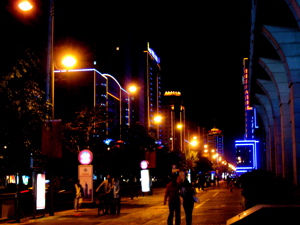
Looking Up and Around
We had already seen the commercial walking street while finding a hotel that would except our white faces, so we didn’t feel like heading that way again. Instead, we noticed a couple of lit steeple-like towers and thought we’d check try to find out what they were. So we struck out at the brisk clip of non-shopping tourists in commercial district. Before long, we’d walked past the shiny surfaces and crowds to the little-known parts of the city that have earned their anonymity. We eventually reached the lit towers and found they were relatively pointless decorations on various buildings. Of course, they probably had some meaning, but we were out to see, not learn.
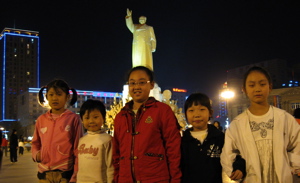
At this point, we pulled out our cameras and took various night shots while striking out in another direction. It didn’t take long to reach Zhongshan Guangchang. I was lining up my first picture of the dancers in front of the Giant Mao when the little girl at my left elbow asked, ‘Where are you from?’ It wasn’t the first time (that night) I’d been a basic question in English by a young learner, so I smiled, answered and went back to capturing the scene recorded only a thousand other times. Her next, ‘Why are you here?’ was a little more surprising. It was no match for the follow-up: ‘Do you have any religious beliefs?’ Gina was in Grade 3 and about as fluent as anyone I’ve met in China. Before long, her cousin, parents and a few friends had assembled, while Andrew gathered some older curious linguists. I smiled to watch over the heads of my audience while other foreigners took their pictures and walked on. I was glad to be in my position instead of theirs.
Gina was a great translator for our impromptu English corner. She waited patiently while others asked more basic questions, but kept interest enough to follow her own more advanced line of questioning when appropriate. She didn’t control the conversation, but was ready to translate when I and her parents had exhausted our store of second-language knowledge. I don’t know how long the discussion would have developed, but Andrew and I were still moderately lost and without dinner. A little coaxing earned me a picture of a few of my learner/teachers. Before we left, Gina approached with a ‘Teacher, this is for you,’ and handed me a pink plastic bead identical to those on the bracelet she was wearing. It didn’t get a bracelet, but it made it back to Changchun with me.
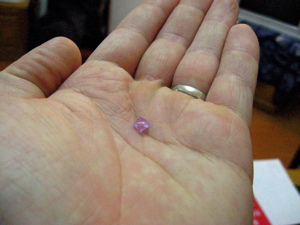
[I would later learn interested parties often assemble in Mao’s shadow to practice their English and hit up foreigners for practice. Savor the irony.]
Experience points: .5
Revelry points: 1
Feeding a Habit
We gradually found our way back toward the hotel and decided it was time to eat. After scouring the walking street, we decided to enjoy the urban development. Thus began a series of dining experiences that managed to avoid all native Chinese food in Shenyang. It wasn’t planned, but it was the happy result of joining holiday spirit and modern development.
Pizza Hut in China could easily get its own post. Maybe it will. For now, I’ll just say it has to exert a little effort to keep from turning into a red-hatted stepchild. It is billed as fine dining. It does serve real pizza, but that doesn’t interest most Chinese, as the lack of cheese in their normal diet renders pizza only moderately enjoyable. Andrew and I enjoyed the unconcealed shock of our waitress when we ordered a thirteen-incher for the two of us (it was labeled as serving four or five). Pizza. Pepsi. It was nice.
The result of eating quite a bit of pizza after living on a Chinese diet for more than a year could easily get its own post. It definitely won’t. For now, I’ll just say I will never again downplay a Chinese friend’s reluctance to eat so much cheese.
Experience points: .5
Revelry points: -3
I know you’re wondering when it will end. Don’t worry, the first half of the trip makes for a good story, the second made for good pictures. There’s not much more to say.
Being Tourists
We timed our arrival at the palace the next morning to coincide with the published opening time, which meant our morning at Starbucks had to start a little early. It wasn’t going to get cut short.
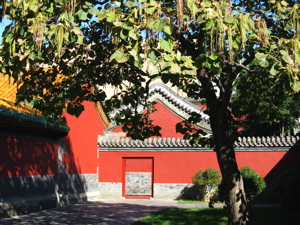
Before administering their government from Beijing, the Qing emperors made Shenyang their capital. When they made the move, they left behind a palace that is basically a smaller Forbidden City. Perfect weather. Spare camera batteries. It was a good visit.
We checked the map to guide our walk to a pagoda in the city. Our path fortuitously crossed the street a few blocks away from the Mao statue. Pictures ensued.
Beiling Park (North Tomb) was an eleven-yuan taxi ride from the pagoda, and it was worth it. Despite an attempt to rip us off at the ticket booth (selling us extra tickets we didn’t want), the park was a great stop. For a minimal fee, visitors can enjoy quite a few acres (if my numbers are right) of relatively peaceful grass around two large lakes. A slightly more hefty fee got us into the tomb complex. I’m not sure it was worth the extra time to see tomb itself, as it looked like, well, a little white hill, but it was why we were there. We did the right thing.
We re-entered the train station about twenty-four hours after leaving it and with plenty of time to spare. The ride home was less eventful. Neither of us really felt like practicing our Chinese, and our benchmates had their hands and backs and shoulders and laps full with an energetic five-year old. I did try to listen in to the children’s book she read to him at one point. It was about, um, stuff.
Ripoff: 20元, -20元 (Good job, Andrew)
Experience points: 1



